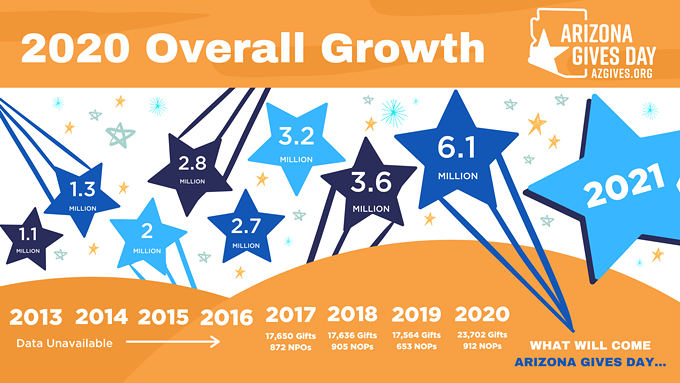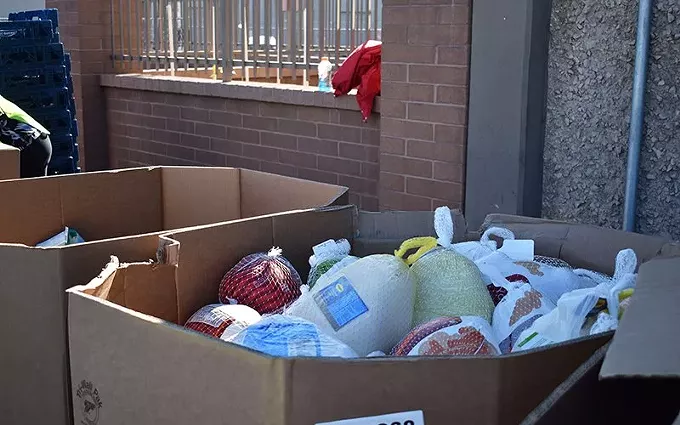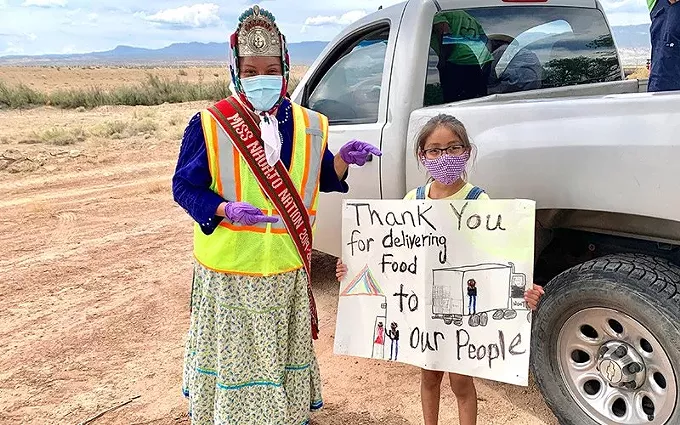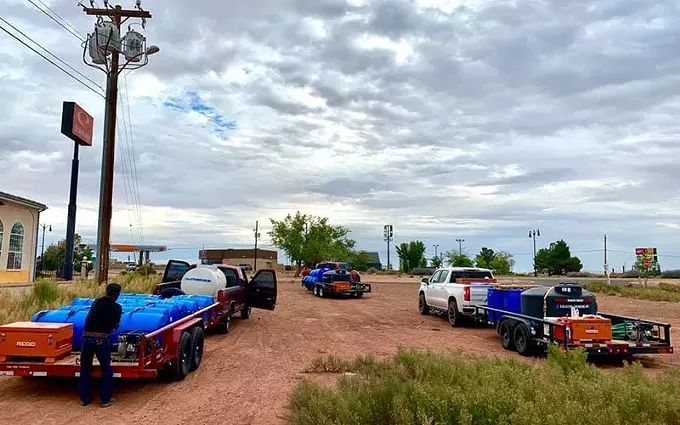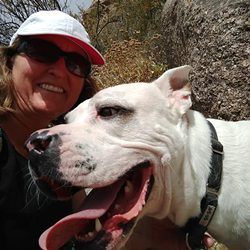Monday, June 28, 2021
The Community Food Bank will be closed on Thursday and will not offer emergency food distribution at its Tucson location and all other resource centers.
New distribution hours will begin on July 6, from 7 to 10 a.m., Tuesdays, Wednesdays and Thursdays at 3003 S. Country Club.
“We continue to offer drive-thru distribution with the earlier hours offering a little relief for volunteers, staff and Arizona National Guard service members who are working getting food into cars as needed,” said Michael McDonald, CEO of the Community Food Bank of Southern Arizona.
Masks are optional during outside food distribution hours. People are asked to present a photo ID to receive emergency food.
More information is available at communityfoodbank.org/Locations
Tuesday, April 6, 2021
It's been a rough year for many nonprofits thanks to a COVID outbreak that not only prevented them from hosting their usual galas and fundraisers but also increased demands on their services, as Tucson Weekly staff writer Christina Duran outlined in this story.
So with today's Arizona Gives Day, you might consider giving to a nonprofit that could really use the help. Learn more about how you can lend a hand here.
Wednesday, March 24, 2021
Standing side by side in the midday sun, two women sort through a box filled with peanut butter, bread, rice and all kinds of canned goods.
“Here’s some cat food,” Elvia Schwenke says.
“Oh, yay!” Laura Stiltner replies as she stacks the items into eight old school lockers that sit outside the Oracle Community Center. “Take what you need. Leave what you can,” an adjacent sign reads.
The metal lockers have been converted into little pantries that serve one big purpose: to fight food insecurity in the unincorporated community of about 4,000 north of Tucson.
“We started seeing a lot of families that were out of work, the kids being home all the time,” said Stiltner, who with Schwenke serves on the community center’s board. “It was kind of motivation to say: We’ve got to do something to help people that just need food and basics right now.
“It makes you feel good inside to know you’re helping people.”
Oracle launched the project in September as a part of the Little Free Pantry movement, one of several efforts worldwide in which people donate food and goods and house them in a neighborhood space to be used by anyone who needs help.
Tuesday, March 16, 2021

GLENDALE – They named her Luna, which is Spanish for moon.
The name fits nicely with the Arizona Coyotes’ crescent moon logo from 1996, which is at center ice this season at Gila River Arena.
Luna is fond of taking naps in Jakob Chychrun’s locker. She wobble-skates on the ice. She has left a mark on the NHL team and soon will make an even bigger impact helping a veteran in need.
“The guys loved when she was around,” Coyotes coach Rick Tocchet said. “She was a great little dog. Big dog now. I love when dogs are around, so hopefully we get another one.”
More than 1.1 million veterans were diagnosed with at least one of five mental illnesses, including post-traumatic stress disorder, bipolar disorder, depression, substance abuse or anxiety, according to a 2016 study by the American Journal of Public Health.
Service dogs assist veterans in healing, and in the U.S., 19% of the dogs are trained to help veterans with PTSD.
Wednesday, November 25, 2020
PHOENIX – At one point Tuesday, cars came through at a rate of one every minute, six lanes across, to get boxes and bags of turkeys, potatoes and canned food from St. Mary’s Food Bank.
Members of the National Guard and volunteers in neon-orange vests, all wearing masks or bandanas, loaded up one car trunk after another to help hundreds from going hungry as the holidays approach.
“Number 6!” “Number Four!” shouted the volunteers as uniformed members of the guard and others brought the boxes to cars and trunks. People also could walk up to get goods, but drive-thru dominated the operation Tuesday.
Hunger has soared in the COVID-19 pandemic, which has cratered the economy, snatched away jobs and removed the assurance that there always will be food on the table. To alleviate the suffering, local governments and nonprofit organizations are providing federal dollars.
A spokesperson for St. Mary’s, the state’s largest food bank, said it set a record – distributing an average of 10 million pounds of food a month since the pandemic hit in March. That’s the most the organization has distributed since it opened its doors more than a half-century ago.
Arizona has given food banks $1.6 million, with $600,000 of that going to St. Mary’s, which also has served the Navajo Nation.
Phoenix has put CARES Act dollars, federal money targeted for pandemic relief, to work by contracting with the Local First Arizona Foundation, a community and economic development organization. The foundation has recruited local restaurants, farmers and other businesses to help prepare and deliver meals.
Monday, August 17, 2020
At times, she attended five or more events in a single day, traveling across the 27,000-square-mile reservation to speak to elementary school students and attend conferences.
“You really hit the ground running,” Parrish recalled. “There’s no event too small. There’s no event too big.”
But in March, as COVID-19 swept through the Southwest, Parrish suddenly went from visiting elders and delivering motivational speeches to distributing food, supplies and information to Navajo families hit hard by the novel coronavirus that causes the deadly disease.
In the months since, Navajos have turned to Parrish for information, encouragement and aid as the virus killed at least 462 Navajos and sickened more than 9,000 others.
“I had a voice as Miss Navajo,” she said. “I never had a second thought about helping.”
Monday, August 3, 2020
When police discovered the woman, she’d been dead at home for at least 12 hours, alone except for her 4-year-old daughter. The early reports said only that she was 42, a mammogram technician at a hospital southwest of Atlanta and almost certainly a victim of COVID-19. Had her identity been withheld to protect her family’s privacy? Her employer’s reputation? Anesthesiologist Claire Rezba, scrolling through the news on her phone, was dismayed. “I felt like her sacrifice was really great and her child’s sacrifice was really great, and she was just this anonymous woman, you know? It seemed very trivializing.” For days, Rezba would click through Google, searching for a name, until in late March, the news stories finally supplied one: Diedre Wilkes. And almost without realizing it, Rezba began to keep count.
The next name on her list was world-famous, at least in medical circles: James Goodrich, a pediatric neurosurgeon in New York City and a pioneer in the separation of twins conjoined at the head. One of his best-known successes happened in 2016, when he led a team of 40 people in a 27-hour procedure to divide the skulls and detach the brains of 13-month-old brothers. Rezba, who’d participated in two conjoined-twins cases during her residency, had been riveted by that saga. Goodrich’s death on March 30 was a gut-punch; “it just felt personal.” Clearly, the coronavirus was coming for health care professionals, from the legends like Goodrich to the ones like Wilkes who toiled out of the spotlight and, Rezba knew, would die there.
Friday, July 31, 2020
PHOENIX – When the sun is up, he’s up and ready to hit the road by 8. Flatbed trucks are loaded with brimming barrels of water, and the teams take off – up and down the burnt orange washboard roads that crisscross the Navajo Nation Reservation.
Zoel Zohnnie grew up on a ranch in these vast lands, knowing what it’s like to live without running water, knowing what it means to drive for miles to fill up at a community water station and then haul it back home.
“For some families, it’s a whole day of leaving home, waiting in line, coming back, unloading,” he said. “Just to drink water and have water for living.”
Tuesday, July 14, 2020
Volunteers will be collecting donations from 2 p.m. to 6 p.m. at Fast Signs located at 3009 E Speedway which will benefit the Boys & Girls Clubs of Tucson.
Donations will be taken via drive-thru to ensure safety and social distancing.
Friday, June 19, 2020
Unfortunately, not all creatures get to share in the love and get left behind, forgotten about, or worse. If they're lucky, they make it to centers like Pima Animal Care Center where they sit and wait for their forever homes.
This can be super stressful for the animal, who only wants to feel safe and comfortable. Instead, they're crowded around other animals they don't know in conditions they're not familiar with, hoping that someone will notice them and take them in.
Enter people like Liz Johnson. Liz volunteers with PACC by fostering some of these animals until someone is willing to give them their home and heart. And now, she's being recognized for her efforts.


